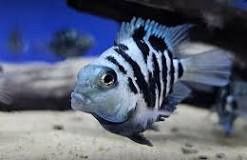Polar bear Parrot Cichlid
Polar Bear Parrot Cichlid Care Guide
1. Tank Setup
-
Tank Size: Minimum 60 L for a pair of Polar Bear Parrots. If keeping more, increase the tank size accordingly.
-
Substrate: Sand or fine gravel is ideal. Smooth substrates prevent damage to their delicate mouths and allow them to explore comfortably.
-
Décor:
-
Hiding Spots: These fish like shelter and territory markers. Include caves, rocks, and driftwood.
-
Driftwood: Optional but appreciated; can provide grazing surfaces and help mimic natural environment.
-
-
Filtration & Water Flow: Moderate water flow is sufficient. They produce some waste, so good filtration is important to maintain clean water.
2. Water Parameters
-
Temperature: 24–28°C (75–82°F)
-
pH: 6.5–7.5
-
Water Hardness: Soft to moderately hard (4–15 dGH)
-
Maintenance: Regular water changes (20–25% weekly) help maintain optimal water conditions and reduce stress or disease.
3. Feeding
-
Diet: Omnivorous
-
Pellets & Flakes: High-quality cichlid pellets or flakes should form the base of their diet.
-
Vegetables: Offer blanched vegetables such as:
-
Zucchini
-
Peas
-
Spinach
-
-
Protein: Occasionally feed frozen or live foods like bloodworms, brine shrimp, or small shrimp pellets.
Feed 1–2 times daily, only what they can consume in a few minutes.
4. Tank Mates
-
Compatible Tankmates:
-
Medium-sized tetras and rasboras
-
Small peaceful cichlids
-
Corydoras or peaceful bottom-dwellers
-
-
Avoid: Tiny fish (may be bullied) and large aggressive cichlids.
5. Breeding
-
Ease: Polar Bear Parrots breed relatively easily.
-
Sexing: Males are larger and may be more territorial.
-
Breeding Setup:
-
Provide caves or flat surfaces for egg-laying.
-
Slightly raising temperature and performing frequent water changes can trigger spawning.
-
-
Fry Care:
-
Fry will eat the same foods as adults in smaller portions.
-
Provide hiding spots for safety.
-
6. Common Health Issues
-
Bloating: Overfeeding or insufficient plant matter can cause bloating. Offer a balanced diet.
-
Ich (White Spot Disease): Poor water quality or stress can lead to ich. Improve water quality and treat if necessary.
-
Fin Rot: Aggression or poor water quality may cause fin rot. Maintain clean water and remove aggressive fish if needed.
7. Behavior & Temperament
-
Semi-aggressive: Polar Bear Parrots can show territorial behavior, especially during breeding or when defending their space. They are generally less aggressive than other large cichlids but may chase smaller or timid fish.
-
Social: They can be kept with other robust, similarly sized cichlids or community fish that aren’t too small. Avoid overly aggressive or extremely passive tankmates.
-
Interactive with Owners: These cichlids often recognize their keepers and may respond to feeding time with curiosity.
Summary:
Polar Bear Parrot Cichlids are hardy, colorful, and moderately easy to care for. They thrive in a well-maintained tank with proper diet, hiding places, and compatible tankmates. They are excellent for both beginner and experienced aquarists who want a small, lively hybrid cichlid.

